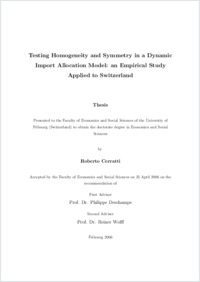Testing homogeneity and symmetry in a dynamic import allocation model : an empirical study applied to Switzerland
Université de Fribourg
- Cerratti, Roberto
- Deschamps, Philippe (Degree supervisor)
- Wolff, Reiner (Degree supervisor)
-
25.04.2006
xii, 167 p
Thèse de doctorat: Université de Fribourg, 2006
English
The aim of this Ph.D. thesis is to estimate an import allocation model for Switzerland and test the homogeneity and symmetry hypotheses implied by demand theory. In previous works, the rejection of these hypotheses has often been attributed to the dynamic mis-specification of the models. Some alternative dynamic specifications (error-correction, autoregressive-errors and partial-adjustment) are considered in order to introduce dynamics and check whether or not they produce any differences in the homogeneity and symmetry test results. The chosen functional form is the AID (Almost Ideal Demand System) model, Firstly used by Winters (1984) for explaining international trade flows. Starting from a general dynamic import allocation model (or its equivalent error-correction form) we specify some simpler dynamic specifications like the autoregressive-errors and partial-adjustment models. A static model is also estimated for comparison purposes. Unconstrained and constrained estimations are computed for each of the dynamic models using maximum likelihood techniques and data of Swiss imported manufactures. The model performances are evaluated according to several criteria (goodness-of-it, information criteria, residual analysis) and, finally, likelihood ratio statistics are computed to test the economic theory assumptions and the different dynamic specifications.
- Faculty
- Faculté des sciences économiques et sociales et du management
- Language
-
- English
- Classification
- Economics
- License
- License undefined
- Identifiers
-
- RERO DOC 5665
- URN urn:nbn:ch:rero-002-101460
- RERO R004120326
- Persistent URL
- https://sonar.ch/global/documents/300094
Statistics
Document views: 205
File downloads:
- 1_CerrattiR.pdf: 139
